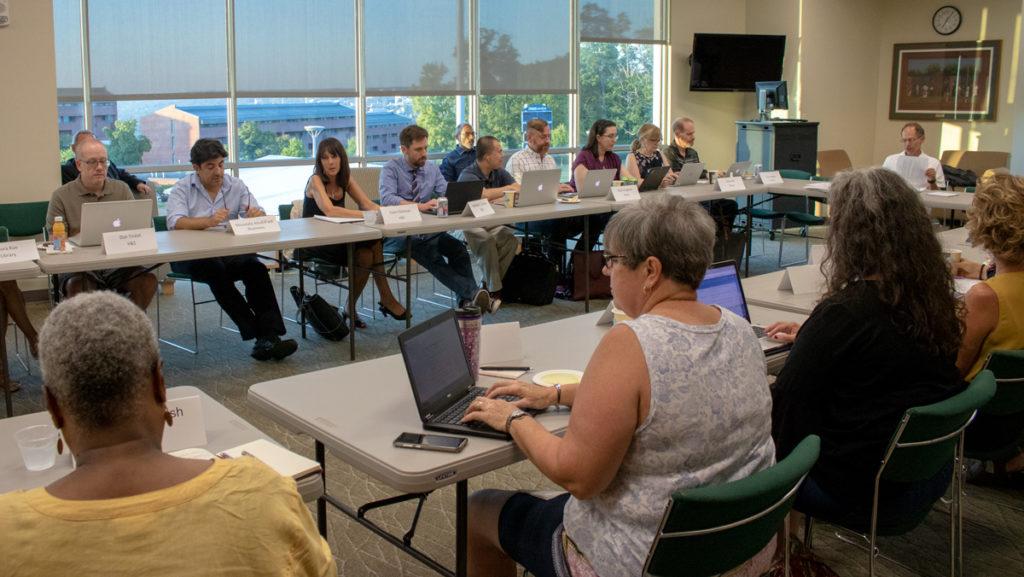Ithaca College President Shirley M. Collado and La Jerne Cornish, provost and senior vice president of academic affairs, spoke at the college’s Faculty Council meeting Sept. 4 to welcome faculty back to the college and seek feedback on faculty-oriented initiatives.
Cornish introduced her new initiatives, the Provost Colloquium Series and Chair’s Academy, while Collado shared her thoughts on Convocation. Cornish also updated the council on the Integrative Core Curriculum program review. Later in the meeting, Sean Eversley Bradwell, director of the Center of Inclusion Diversity Equity and Social Change, discussed the Bias Impact Reporting initiative that will allow students, faculty and staff to report instances of bias on campus.
Cornish also said she would like the Faculty Council to meet twice a month rather than once a month so the council can work on the five-year strategic plan without taking away from normal meeting time. She then introduced her idea, the Provost Colloquium Series, which will aim to highlight the work of Dana professors and more than 37 faculty members who went on sabbatical last year.
Cornish also asked the faculty for feedback on her second initiative, the Chair’s Academy, which is designed to help support department chairs and clarify their responsibilities, she said. She said she is working with Wade Pickren, director for the Center for Faculty Excellence, on the initiative.
One of her ideas for the initiative involves a five-year term for department chairs and an election of a new chair in the fourth year of that term. In the fifth year, the current department chair would work alongside the elected chair to train them. She said this would give chairs a longer amount of time to learn the processes involved with the job and allow for a better training process.
Claire Gleitman, professor in the Department of English, said she liked the initiative because it would involve interaction between department chairs across the schools.
“It sounds exciting,” Gleitman said. “I’m not currently department chair, but I was for many years, and it did strike me when I was department chair that it was a little surprising that the chairs never met across the different schools. So that would be very worthwhile.”
Gleitman also said she was concerned that the academy could add to the already large workload that department chairs have.
David Turkon, associate professor in the Department of Anthropology, expressed similar concerns about department chairs doing more over the summer months.
“One of the common experiences you hear from chairs is that during those years as chair, their research suffers,” Turkon said. “Summertime is often the breathing time for chairs with that research.”
Cornish updated the council on the composition of the Integrated Core Curriculum Program Review Committee and said there will be five students on it — one from each school. She said she will be working with senior Alyse Harris, president of the Student Governance Council, to select the five students.
Cornish also announced that the search for a dean of the School of Humanities and Sciences has begun. She said eight faculty members have expressed interest in serving on the search committee, but she did not disclose the names of the interested faculty.
Collado also attended the meeting to share some of her thoughts with the council. She said she was surprised to receive many emails from students describing their positive experiences at Convocation.
Collado also asked faculty members to share their feedback about the strategic planning process.
“Now is the time to be engaged,” Collado said. “It’s really, really fundamental that we think about getting a variety of deep voices across the faculty. We have a variety of perspectives we want to encompass.”
After Cornish and Collado spoke, Bradwell answered questions about the bias reporting initiative. Bias reporting will allow students, faculty and staff to record any instances of bias. Bradwell said the reporting system will be carried out through an online form on IC Workflow.
Bradwell said the team managing the reporting initiative includes himself; Bill Kerry, director of the Office of Public Safety and Emergency Management; Title IX coordinator Linda Koenig; Dean of Students Bonnie Prunty; Luca Maurer, director of LGBTQ Education, Outreach and Services; a communication associate and a faculty member.
Bradwell said there will be no investigative aspect of the system but will instead provide resources to those who experience bias. The form is not anonymous, Bradwell said. At the end of the semester, the team will take the compiled reports and meet with a Bias Impact Advisory Committee, which will be made up of about 30 faculty members, deans, human resources members, students and legal counsel.
He said this initiative was one of the recommendations made through the campus climate survey given in 2017. The form will not act as an official report and should not be used in the case of emergencies, Bradwell said. He said there will be links in the form to direct users to official reporting mechanisms and to emergency services. The form is intended to act as a database, he said. The initiative was originally piloted over the summer of 2018.
Peyi Soyinka-Airewele, council member and professor and chair of the Department of Politics, said the bias impact system is much needed.
“It’s something for students who don’t know where to go when they face this,” she said.
At the end of the meeting, the council also discussed the role of meetings at each level of the tenure and promotion process. They did not come to a conclusion on the matter, and the issue was tabled until the October meeting.








